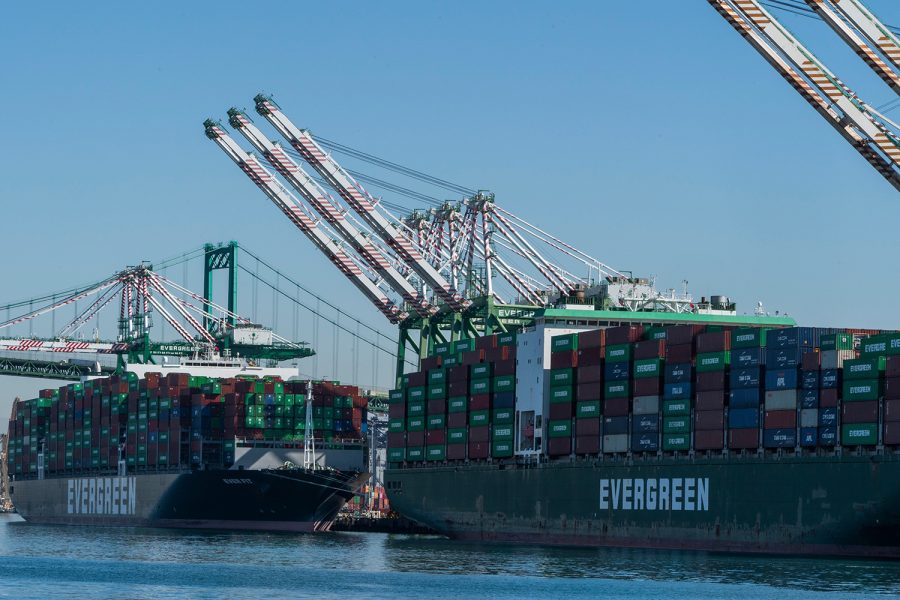Opinion | Iowa, inflation, and the supply chain
The recent rise in prices we are seeing is due to supply chain disruptions.
Robert Hanashiro / USA TODAY NET
Oct 16, 2021; San Pedro, Calif., USA; Cargo ships wait to be off loaded at the Port of Los Angeles. Supply chain issues have caused shortages of goods throughout the country with cargo ships waiting off shore in Southern California to off-load. (Robert Hanashiro/USA TODAY)
October 28, 2021
The inflation that this country is facing is still transitory, meaning temporary. However, the recent forecasts by the Federal Reserve have led many economists to believe that because of the stress on global supply chains, inflation will not go back down to its pre-pandemic levels until 2022.
Like many Iowans, my parents have been complaining about the high inflation rate and how it has led the prices of a variety of goods in the past year to rise by 5 percent.
Republicans, such as Sen. Joni Ernst, are quick to blame Iowa’s inflation woes on the spending bills that were passed at the height of the pandemic. It’s a lot more complicated than that.
Thanks to free trade, the U.S economy has been able to expand the variety of goods and services it can provide to consumers for relatively cheap prices year round. Low shipping costs make it easier for the U.S. to import goods from around the world, rather than producing those goods within the confines of the country.
In other words, the Bread Garden Market on Linn Street is able to carry peaches in February because we import our peaches from temperate countries who specialize in growing the delicious fruit.
Of course, the pandemic has disrupted global supply chains as ports were temporarily shut down and it was taking months for goods to reach consumers. Now that ports are starting to open up again, the supply chain is becoming overwhelmed, as ports and trucking companies are short-staffed, signaling a longer than anticipated road to recovery.
It should be worth mentioning that Republicans are fair to argue that the spending bills, like the American Rescue Plan have been somewhat responsible for exacerbating inflation. During the pandemic, the government showered families with cash and now Americans are demanding goods at a quantity beyond the capacity of the supply chain.
As a result, bottlenecks have been created where producers cannot get their goods out in time because there is a worker shortage going on, and there is nobody to unload the cargo and bring it to your grocery store or shopping center.
Using the logic of Econ 101, when the demand of a good outpaces the supply that producers can provide, then the prices of the good goes up.
Given the events of recent episodes of the soap opera known as the U.S congress, fiscal policy will not play a role in curbing inflation. It looks like the Federal Reserve will have to tinker with monetary policy if they want to get inflation under control.
The first policy is to assume that the inflation we are facing is embedded into the economy and therefore, the Federal Reserve should raise interest rates before the problem gets worse. The problem with this policy is that it leads to lower inflation but slows the economic recovery to the point where it may be difficult to restart the economy.
The second option is to treat inflation as transitory and wait for the supply chain issue to figure itself out. Analysis of core inflation, the inflation rate that really matters, shows that the inflation we are facing is not going to last. Waiting also gives the opportunity for more data collection to take place and allow the central bank to make a better decision.
Until the global supply chain figures itself out, we will have to weather the storm. However, this does mean we should preemptively act and inflame the inflation problem. For now, the best thing policymakers can do is wait and see.
Columns reflect the opinions of the authors and are not necessarily those of the Editorial Board, The Daily Iowan, or other organizations in which the author may be involved.



